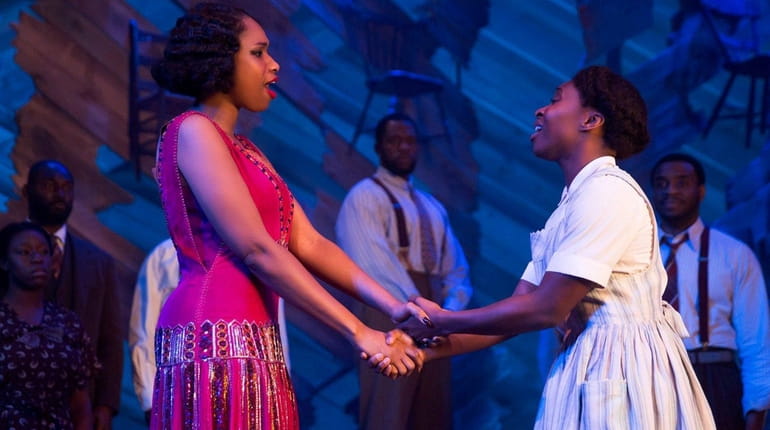‘The Color Purple’ review: Showstopper stuns on Broadway

Jennifer Hudson, left, and Cynthia Erivo in "The Color Purple," a new, slimmed-down version directed by John Doyle. Credit: Matthew Murphy
WHAT “The Color Purple”
WHERE Jacobs Theatre, 242 W. 45th St.
INFO $75-$145; 212-239-6200; colorpurple.com
BOTTOM LINE Streamlined revival, show-stopping new star.
Genuine showstoppers rarely happen in the musical theater, especially in the middle of an act. But when they do, something happens — maybe to the air pressure in the lungs of theatergoers — which seems to buoy whole groups of disparate audiences to their feet.
It happened at a recent preview of “The Color Purple” and, chances are, it’s happening every night. Edging toward the finale of the show, Cynthia Erivo, a British actress in her thrilling Broadway debut, lays into a song (“I may be poor, I may be black, I may be ugly, but I’m here!”) full of defiant realization for her character Celie after a lifetime of insult, drudgery and self-sacrifice.
It could be cornball, but it certainly is not. Director John Doyle’s passionate, scaled-down, streamlined, low-frills revival of the 2005 musical adaptation of Alice Walker’s 1982 Pulitzer-winning novel is not priming us for big musical-theater gestures. And Erivo, who also played Celie in Doyle’s hit London reduction, exquisitely paces the understated character through 40 tumultuous years of male-dominated, post-slavery African-American culture.
Jennifer Hudson, whose Oscar-winning portrayal of Effie in the “Dreamgirls” movie made her an expert in showstoppers, gets believably sultry, if not sizzlingly sexual, as Shug Avery, the omnisexual blues singer whom everyone loves and who frequently loves in return.
Danielle Brooks (Taystee in “Orange is the New Black”) is an endearing powerhouse as Sofia, the self-sufficient woman who delivers the irresistible “Hell No!,” a rousing women’s empowerment anthem. Other highlights in a fine cast are the three church ladies, a Greek chorus of gossips whose contrapuntal cackles are interspersed as comic relief.
Doyle also designed the attractively stark set — wood boards haphazardly nailed together and hung with mismatched wooden chairs. The characters stand in a line at the beginning of each act, then live through their travails with little more than chairs and baskets and simple, moving storytelling.
The score — blues, gospel, swing, African and gutbucket work-songs — are by pop veterans Brenda Russell, Allee Willis and Stephen Bray. These are direct, accessible songs that are simply structured but not simple-minded.
I appreciated the original as a big, old-fashioned, middle-of-the-road show — a bit too nice and too easily resolved for an epic about racial oppression.It is less big and feels newer now, but is still rich with characters adapted by playwright Marsha Norman. Doyle has cut what I count as eight songs from the score, a decision that eliminates some richness from the back-stories and puts more emphasis than I remember on religion — and makes Celie the show-stunner she deserves to be.
